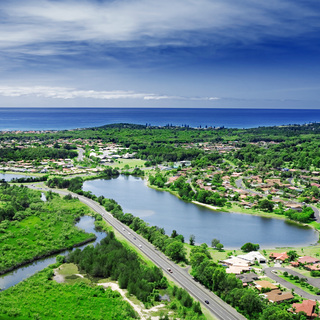
Development of a Climate Resilient Design Guide for Infrastructure
In partnership with the University of Sydney and the University of Technology Sydney (UTS), we are helping to prepare new national guidelines regarding climate resilient materials.
In partnership with the University of Sydney and the University of Technology Sydney (UTS), we are helping to prepare new national guidelines regarding climate resilient materials. The new guidelines, known as Practice Note 12.2: Climate resilient materials for infrastructure assets (PN 12.2) will be released by the Institute of Public Works Engineering Australasia (IPWEA) to supplement the existing Practice Note 12.1: Climate Change Impacts on the Useful Life of Infrastructure (PN 12.1), previously prepared by Northern Beaches Council and IPWEA.
This national guideline will provide Australian local governments access to information regarding resilient construction materials and provide a decision pathway for their selection and use.
The new guidelines are focused on the suitability and sustainability of the most common construction materials used in asset rebuilding or renewal projects e.g., concrete, steel, bitumen, wood and PVC. It presents innovative solutions and practices to increase resilience to a range of natural hazards that will intensify due to climate change. They can be used for new construction and for asset life-extension works.
We developed a decision tree for the guide with worked examples, to help users select material options that best suit their need. To ensure the usability of the information in the guide, we conducted a user testing workshop with participating councils. Several case study of the use of resilient materials are also developed.

Seqwater is the Queensland Government Bulk Water Supply Authority and manages over $11 billion of water supply infrastructure - including dams and weirs, conventional water treatment plants, a desalination plant, the Western Corridor Recycled Water Scheme, as well reservoirs, pump stations and more than 600 kilometres of bi-directional pipeline network. As part of Seqwater's climate change risk management, this project assessed climate change vulnerability of Seqwater's built assets.

In association with Buckley Vann town planners and the Department of Civil Engineering at the University of Queensland (UQ), we undertook a climate change vulnerability and adaptation planning study for the remote centre of Choiseul Bay, at the northern tip of the Solomon Islands.

Reliability of process design of water treatment works in Hong Kong was enhanced through various studies and reviews.

Following on from our role in assisting Stockland to carry out environmental assessments and obtain federal approval for the project, we have been responsible for the planning and design of the stormwater quality and flood risk management strategy for the Aura site as well as on-going surface and groundwater monitoring.